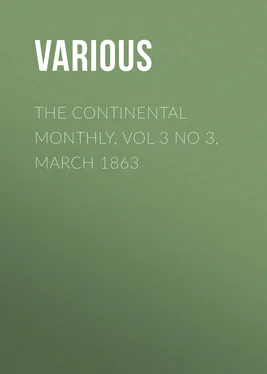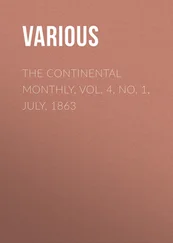Various - The Continental Monthly, Vol 3 No 3, March 1863
Здесь есть возможность читать онлайн «Various - The Continental Monthly, Vol 3 No 3, March 1863» — ознакомительный отрывок электронной книги совершенно бесплатно, а после прочтения отрывка купить полную версию. В некоторых случаях можно слушать аудио, скачать через торрент в формате fb2 и присутствует краткое содержание. Жанр: foreign_antique, periodic, Языкознание, Политика, foreign_edu, на английском языке. Описание произведения, (предисловие) а так же отзывы посетителей доступны на портале библиотеки ЛибКат.
- Название:The Continental Monthly, Vol 3 No 3, March 1863
- Автор:
- Жанр:
- Год:неизвестен
- ISBN:нет данных
- Рейтинг книги:5 / 5. Голосов: 1
-
Избранное:Добавить в избранное
- Отзывы:
-
Ваша оценка:
- 100
- 1
- 2
- 3
- 4
- 5
The Continental Monthly, Vol 3 No 3, March 1863: краткое содержание, описание и аннотация
Предлагаем к чтению аннотацию, описание, краткое содержание или предисловие (зависит от того, что написал сам автор книги «The Continental Monthly, Vol 3 No 3, March 1863»). Если вы не нашли необходимую информацию о книге — напишите в комментариях, мы постараемся отыскать её.
The Continental Monthly, Vol 3 No 3, March 1863 — читать онлайн ознакомительный отрывок
Ниже представлен текст книги, разбитый по страницам. Система сохранения места последней прочитанной страницы, позволяет с удобством читать онлайн бесплатно книгу «The Continental Monthly, Vol 3 No 3, March 1863», без необходимости каждый раз заново искать на чём Вы остановились. Поставьте закладку, и сможете в любой момент перейти на страницу, на которой закончили чтение.
Интервал:
Закладка:
P.S. Try to send me, too, something from France, not because I'm afraid I shall forget you, but I want something from you to carry always about me. Kiss what you send me. I know I shall find at once where you kissed it.
When the colonel finished reading the letter, Piter said:
'Arnold gave me this letter last night when I received my billet paper. For my life's sake I could not sleep; I lay awake all night long, thinking of home and of Mary. She asked for something from France. I had no money. I drew three months' advance last week to send home to my brother and my cousin. This morning, when I got up to go, I opened my window. A blue handkerchief was hanging on a clothes line; it looked like Mary's; it was the same color, the same white lines; I was so weak as to take it, and put it in my knapsack. I went out into the street; I was sorry for what I had done; I was going back to the house with it just when this lady ran after me. The handkerchief was found in my knapsack. This is all the truth. The capitulation orders me to be shot. Shoot me, but don't despise me.'
The judges could not conceal their emotion; but when the balloting took place, he was unanimously condemned to death. He heard his sentence with sang-froid; after it was passed on him, he went up to his captain and asked him to lend him four francs. The captain gave them to him. I then saw Piter go to the woman to whom the blue handkerchief had been restored, and I heard him say:
'Madame, here are four francs; I don't know whether your handkerchief is worth more, but even if it is, I pay dear enough for it to engage you to knock off the rest.'
Taking the handkerchief from her, he kissed it, and gave it to the captain.
'Captain,' said he, 'in two years you'll be returning home; when you go toward Areneberg, ask for Mary; give her this blue handkerchief, but don't tell her how dearly I purchased it.'
Piter then kneeled and prayed fervently; when his prayers were ended, he arose and walked with a firm step to the place of execution. I forgot that I was a scientific man, and I walked down into the woods to avoid seeing the end of this cruel tragedy. A volley of musketry soon told me that all was over.
I returned to the fatal spot an hour afterward; the regiment had marched away; all was calm and silent. While following the edge of the grove, going to the highway, I perceived at a short distance before me traces of blood, and a mound of freshly heaped earth. I took a branch from one of the fir trees, and made a rude cross.
I placed it at the head of poor Piter's grave, now forgotten by every body except by me, and perhaps by Mary.
GOLD
Gold, next to iron, is the most widely diffused metal upon the surface of our globe. It occurs in granite, the oldest rock known to us, and in all the rocks derived from it; it is also found in the veinstones which traverse other geological formations, but has never been found in any secondary formation. It is, however, much more common in alluvial grounds than among primitive and pyrogenous rocks. It is found disseminated, under the form of spangles, in the silicious, argillaceous, and ferruginous sands of certain plains and rivers, especially in their junction, at the season of low water, and after storms and temporary floods. It is the only metal of a yellow color; it is readily crystallizable, and always assumes one or more of the symmetrical shapes, such as the cube or regular octahedron. It affords a resplendent polish, and may be exposed to the atmosphere for any length of time, without suffering any change; it is remarkable for its beauty; is nineteen times heavier than water, and, next to platinum, the heaviest known substance; its malleability is such, that a cubic inch will cover thirty-five hundred square feet; its ductility is such, that a lump of the value of four hundred dollars could be drawn into a wire which would extend around the globe. It is first mentioned in Genesis ii, 11. It was found in the country of Havilah, where the rivers Euphrates and Tigris unite and discharge their waters into the Persian gulf.
The relative value of gold to silver in the days of the patriarch Abraham was one to eight; at the period of B.C. 1000, it was one to twelve; B.C. 500, it was one to thirteen; at the commencement of the Christian era, it was one to nine; A.D. 500, it was one to eighteen; A.D. 1100, it was one to eight; A.D. 1400, it was one to eleven; A.D. 1613, it was one to thirteen; A.D. 1700, it was one to fifteen and a half; which latter ratio, with but slight variation, it has maintained to the present day. Gold was considered bullion in Palestine for a long period after silver had been current as money. The first mention of gold money in the Bible is in David's reign (B.C. 1056), when that king purchased the threshing floor of Oman for six hundred shekels of gold by weight. In the early period of Grecian history the quantity of the precious metals increased but slowly; the circulating medium did not increase in proportion with the quantity of bullion. In the earliest days of Greece, the precious metals existed in great abundance in the Levant. Cabul and Little Thibet (B.C. 500) were abundant in gold. It seems to be a well ascertained fact, that it was obtained near the surface; so that countries, which formerly yielded the metal in great abundance, are now entirely destitute of it. Crœsus (B.C. 560) coined the golden stater , which contained one hundred and thirty-three grains of pure metal. Darius, son of Hystaspes (B.C. 538), coined darics , containing one hundred and twenty-one grains of pure metal, which were preferred, for several ages throughout the East, for their fineness. Next to the darics were some coins of the reigns of the tyrants of Sicily: of Gelo (B.C. 491); of Hiero (B.C. 478); and of Dionysius (B.C, 404). Specimens of the two former are still preserved in modern cabinets. Darics are supposed to be mentioned in the latter books of the Old Testament, under the name of drams . Very few specimens of the daric have come down to us; their scarcity may he accounted for by the fact that they were melted down under the type of Alexander. Gold coin was by no means plenty in Greece until Philip of Macedon had put the mines of Thrace into full operation, about B.C. 360. Gold was also obtained by the Greeks from Asia Minor, the adjacent islands, which possessed it in abundance, and from India, Arabia, Armenia, Colchis, and Troas. It was found mixed with the sands of the Pactolus and other rivers. There are only about a dozen Greek coins in existence, three of which are in the British Museum; and of the latter, two are staters , of the weight of one hundred and twenty-nine grains each. About B.C. 207, gold coins were first struck off at Rome, and were denominated aurei , four specimens of which are in the institution before alluded to. Their weight was one hundred and twenty-one grains. Gold coins were first issued in France by Clovis, A.D. 489; about the same time they were issued in Spain by Amalric, the Gothic king; in both kingdoms they were called trientes . They were first issued in England A.D. 1257, in the shape of a penny. Florins were next issued, in 1344, of the value of six shillings. The guinea was first issued in 1663, of Guinea gold. In 1733 all the gold coins—nobles, angels, rials, crowns, units, lions, exurgats, etc., etc., were called in and forbidden to circulate. The present sovereign was first issued in 1817.
From the commencement of the Christian era to the discovery of America, the amount of gold obtained from the surface and bowels of the earth is estimated to be thirty-eight hundred millions of dollars; from the date of the latter event to the close of 1842, an addition of twenty-eight hundred millions was obtained. The discovery and extensive working of the Russian mines added, to the close of 1852, six hundred millions more. The double discovery of the California mines in 1848, and of the Australia mines in 1851 has added, to the present time, twenty-one hundred millions; making a grand total of ninety-three hundred millions of dollars. The average loss by wear and tear of coin is estimated to be one-tenth of one per cent, per annum; and the loss by consumption in the arts, by fire and shipwreck, at from one to three millions per annum.
Читать дальшеИнтервал:
Закладка:
Похожие книги на «The Continental Monthly, Vol 3 No 3, March 1863»
Представляем Вашему вниманию похожие книги на «The Continental Monthly, Vol 3 No 3, March 1863» списком для выбора. Мы отобрали схожую по названию и смыслу литературу в надежде предоставить читателям больше вариантов отыскать новые, интересные, ещё непрочитанные произведения.
Обсуждение, отзывы о книге «The Continental Monthly, Vol 3 No 3, March 1863» и просто собственные мнения читателей. Оставьте ваши комментарии, напишите, что Вы думаете о произведении, его смысле или главных героях. Укажите что конкретно понравилось, а что нет, и почему Вы так считаете.












